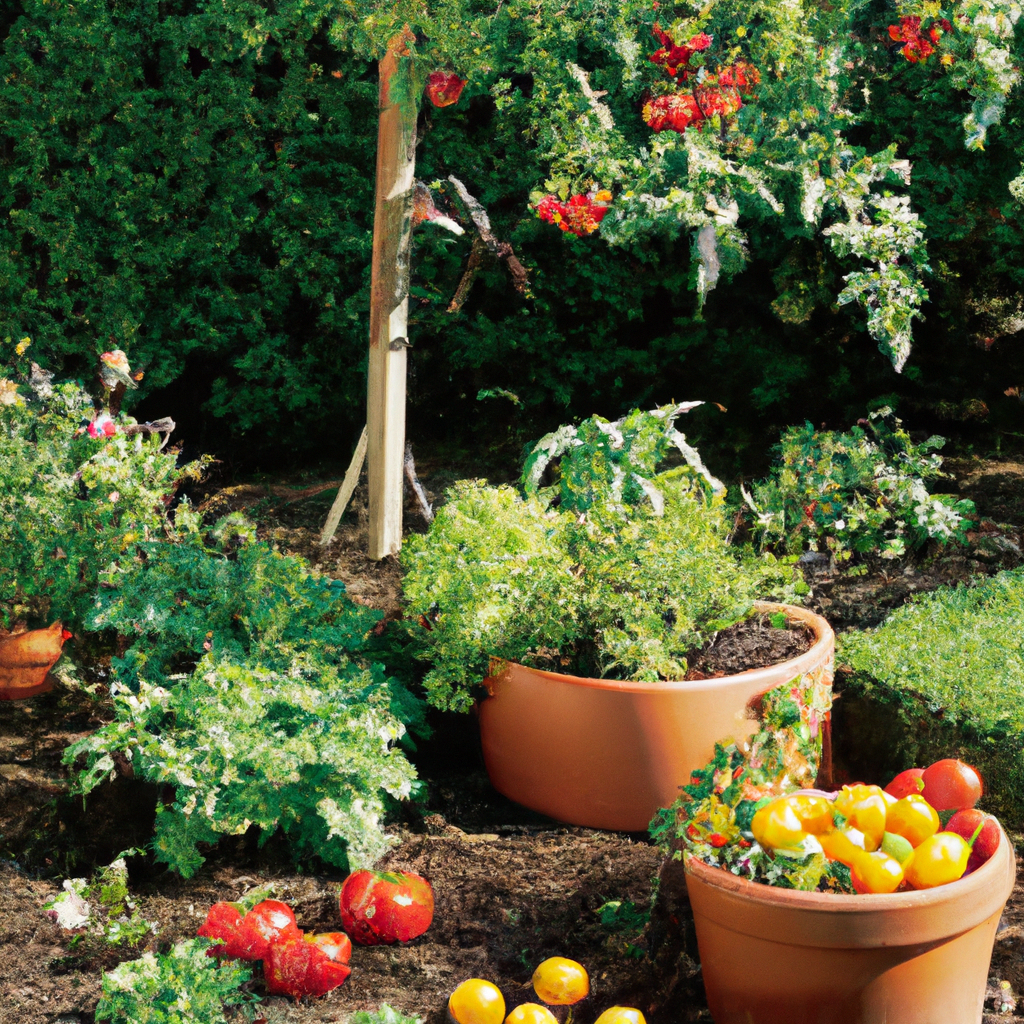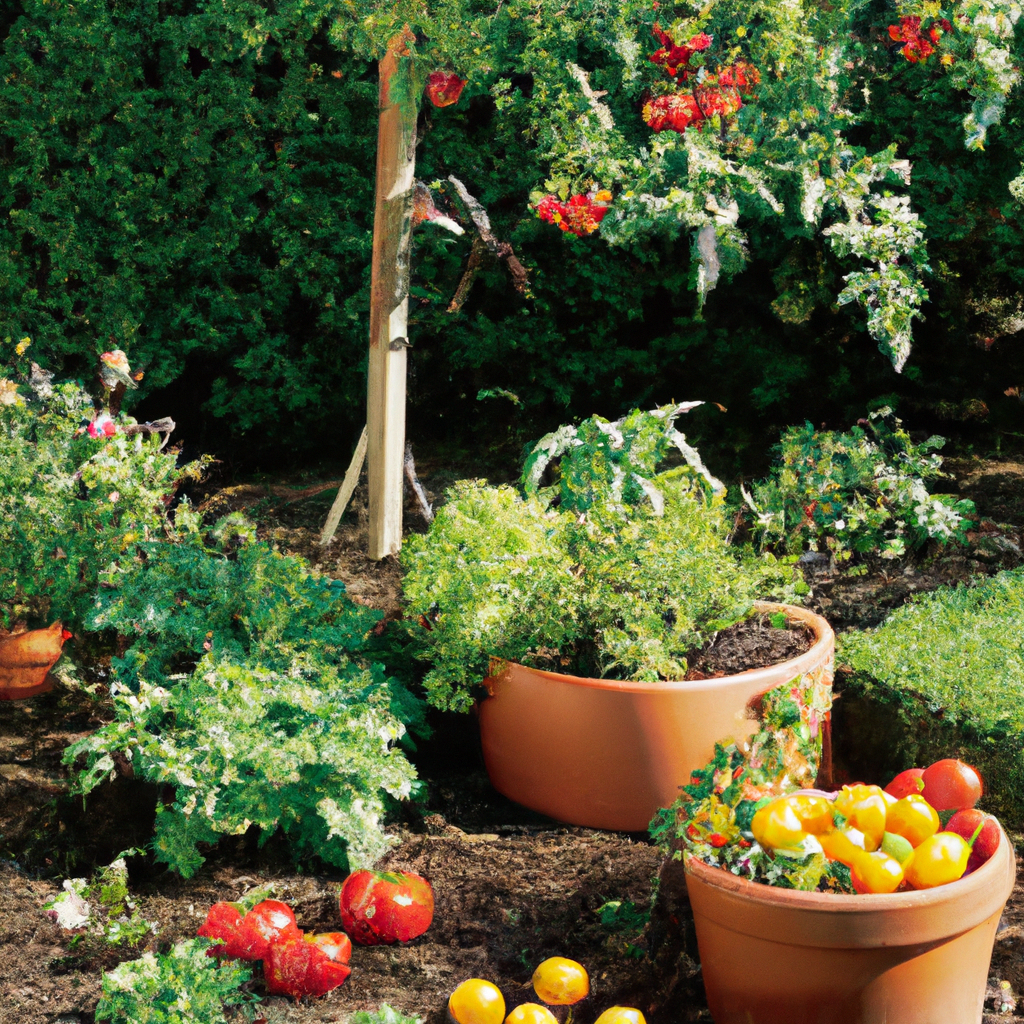
Imagine living in a bustling city with towering skyscrapers and busy streets, but amidst the concrete jungle lies a hidden oasis of green. Organic urban farming is a revolutionary concept that brings the beauty and benefits of farming directly to the heart of the city. By combining the principles of organic agriculture with urban spaces, this innovative approach allows individuals to reconnect with nature, cultivate their own food, and foster a sense of community. In this article, we will explore the numerous benefits that organic urban farming brings to both individuals and the environment, and why it is becoming an increasingly popular movement in cities around the world.

Benefits of Organic Urban Farming
Organic urban farming is becoming more and more popular, and for good reason. Not only is it a sustainable and eco-friendly practice, but it also offers a range of benefits that positively impact individuals, communities, and the environment as a whole. Let’s explore some of the key advantages of organic urban farming and why it has gained so much attention in recent years.
Environmental Sustainability
One of the most significant benefits of organic urban farming is its positive impact on the environment. By practicing sustainable farming methods, organic urban farmers help reduce their carbon footprint and promote a healthier planet. This is accomplished through several means.
Reduces Carbon Footprint
Traditional farming practices often employ heavy machinery and fossil fuels, which significantly contribute to carbon emissions. In contrast, organic urban farming relies on manual labor and nature-friendly techniques, resulting in a much lower carbon footprint. By reducing the use of machinery and fossil fuels, organic urban farming helps combat climate change and promotes a greener future.
Conserves Water
Water scarcity is a global issue that many urban areas face. Organic urban farming takes on an important role in conservation efforts by implementing efficient irrigation methods. These methods, such as drip irrigation and rainwater harvesting, help minimize water waste and ensure that water resources are utilized responsibly. By conserving water, organic urban farming contributes to the sustainable management of this valuable resource.
Preserves Soil Quality
The soil is the foundation of any successful farm, and organic urban farming places a strong emphasis on preserving soil quality. Traditional farming practices often rely on chemical fertilizers, pesticides, and herbicides, which can degrade soil health over time. In contrast, organic urban farming prioritizes the use of natural and organic fertilizers, such as compost and manure, which enrich the soil and promote its long-term fertility. This focus on maintaining soil health helps create a sustainable farming ecosystem and ensures the productivity of urban farms for years to come.
Minimizes Chemical Pollutants
Chemical pollutants from synthetic fertilizers and pesticides used in conventional farming can have detrimental effects on ecosystems and human health. Organic urban farming eliminates or significantly reduces the use of these harmful chemicals, thereby minimizing their impact on the environment. By opting for organic alternatives, urban farmers create a safer and healthier environment for both themselves and their communities.
Encourages Sustainable Land Use
Urban areas are often characterized by concrete jungles and a lack of green spaces. Organic urban farming transforms unused spaces, such as rooftops, balconies, and vacant lots, into productive and sustainable gardens. By utilizing these spaces effectively, organic urban farmers contribute to sustainable land use practices and maximize the potential of urban environments. This not only beautifies the cityscape but also improves air quality and enhances the overall aesthetic appeal of the community.
Health Benefits
In addition to its positive impact on the environment, organic urban farming offers a wide range of health benefits. These benefits extend to individuals who consume organic produce as well as those involved in the farming process.
Elimination of Chemical Residues
One of the key advantages of organic urban farming is its commitment to eliminating chemical residues in food. Unlike conventionally grown produce, organic fruits and vegetables are grown without the use of synthetic pesticides and herbicides. This means that when you consume organic produce from urban farms, you’re avoiding exposure to potentially harmful chemicals, reducing the risk of pesticide residues in your diet.
Higher Nutritional Value
Organic produce is known to have higher nutritional value compared to conventionally grown counterparts. Research shows that organic fruits and vegetables contain higher levels of vitamins, minerals, and antioxidants. This is due to the sustainable farming practices employed by organic urban farmers, which enhance the soil’s nutrient content and promote the growth of healthier crops. By consuming organic produce, you can ensure that you’re nourishing your body with the best possible nutrients.
Reduces Risk of Contaminants
Contaminants such as heavy metals, antibiotics, and genetically modified organisms are a growing concern in our food system. Organic urban farming provides a solution to this issue by adhering to strict organic standards that prohibit the use of GMOs and limit exposure to contaminants. By choosing organic produce, you can reduce the risk of ingesting harmful substances and enjoy a safer and more wholesome diet.
Promotes Physical Activity
Engaging in organic urban farming not only provides access to fresh produce but also promotes physical activity. Gardening tasks, such as planting, weeding, and harvesting, require physical exertion, allowing individuals to stay active and improve their overall fitness. In a world where sedentary lifestyles are becoming increasingly prevalent, organic urban farming offers an enjoyable and productive way to incorporate physical activity into your daily routine.

Access to Fresh, Nutrient-rich Food
With the rise of industrialized food production and long-distance transportation, access to fresh and nutrient-rich food has become a challenge for many urban communities. Organic urban farming is a game-changer in this respect, offering numerous advantages when it comes to food accessibility and quality.
Reduced Transportation Distance
Conventional agriculture often involves transporting produce over long distances, resulting in nutrient loss and a decreased shelf life of fresh food. Organic urban farming eliminates this issue by bringing food production closer to communities. By growing food locally, organic urban farmers reduce transportation distances and ensure that fresh produce reaches consumers quickly. This reduces the time between harvest and consumption, maximizing the freshness and nutritional value of the food.
Improved Food Quality
Freshness is a crucial component of food quality, and organic urban farming excels in this area. With urban farms located within or near communities, organic produce can be harvested at peak ripeness and immediately brought to local markets or consumers. This means that when you purchase organic produce from urban farms, you’re getting fruits and vegetables that haven’t been sitting on store shelves for weeks. The superior taste, texture, and quality of organic urban farming make it a desirable choice for those seeking the best food experience.
Food Security
Food security is a pressing concern in many communities, especially those located in food deserts where access to nutritious food is limited. Organic urban farming plays a crucial role in addressing this issue by providing a source of fresh, locally grown produce in urban areas. By establishing community gardens and urban farms, organic urban farmers increase food security, ensuring that everyone has access to nourishing food options regardless of their socioeconomic status. This empowers individuals and communities to take control of their food choices and promotes a healthier and more equitable food system.
Community Engagement
Organic urban farming fosters a strong sense of community and social connection. By bringing people together to work towards a shared goal, it creates an environment where individuals can thrive and build meaningful relationships.
Sense of Belonging
In a fast-paced and disconnected world, organic urban farming offers a sense of belonging. By participating in community gardening projects or supporting local urban farms, individuals become part of a collective effort to cultivate a sustainable food system. This sense of belonging strengthens community bonds and reinforces the idea that we are all caretakers of the environment and each other.
Promotes Social Interaction
Organic urban farming provides opportunities for people of different backgrounds and ages to come together and collaborate. Whether it’s working side by side in a community garden or attending workshops and events hosted by urban farms, these interactions foster meaningful connections. Sharing knowledge, experiences, and stories around food and farming enhances social cohesion and creates a stronger and more connected community.
Creates a Strong Support Network
Engaging in organic urban farming connects individuals to a network of like-minded people who share a passion for sustainable living and healthy food. This support network provides a valuable resource for advice, encouragement, and collaboration. Whether it’s trading gardening tips, sharing surplus produce, or brainstorming innovative farming practices, the support network surrounding organic urban farming is a powerful and enriching asset to individuals and communities alike.

Reduced Food Waste
Food waste is a significant issue globally, with an estimated one-third of all food produced ending up in landfills. Organic urban farming offers a solution to this problem by minimizing food waste and maximizing the utilization of resources.
Direct Consumption
One of the advantages of growing food in an urban setting is the ability to consume it immediately. Whether you’re cultivating herbs on your windowsill or maintaining a small vegetable garden in your backyard, organic urban farming allows for the direct consumption of freshly harvested produce. This eliminates the need for excess packaging, transportation, and storage, reducing the overall food waste generated.
Donation to Food Banks
Urban farms often produce a surplus of fresh food, which can be donated to local food banks and charities. By partnering with these organizations, organic urban farmers help address food insecurity and ensure that nutritious food reaches those in need. This form of food donation not only reduces waste but also supports vulnerable members of society by providing them with access to fresh and healthy ingredients.
Composting
Organic waste generated from urban farms can be transformed into valuable compost through the process of composting. Composting allows organic matter, such as food scraps and plant trimmings, to break down naturally into nutrient-rich soil amendment. By implementing composting practices, organic urban farmers divert waste from landfills and create a valuable resource that improves soil fertility and supports future crop growth. This circular approach to waste management reduces the environmental impact of organic urban farming while closing the loop on the food production cycle.
Biodiversity and Conservation
Maintaining biodiversity and conserving natural resources is vital for the health of our planet. Organic urban farming plays a key role in promoting biodiversity and contributing to conservation efforts.
Supports Native Plant and Animal Species
Urban environments often lack the biodiversity found in more natural habitats. However, organic urban farming offers an opportunity to reintroduce native plant species and provide habitats for local fauna. By incorporating native plantings into urban farms, organic farmers create valuable habitats for birds, insects, and small animals, allowing them to thrive amid the concrete jungle. This fosters a more balanced and resilient ecosystem, adding beauty and biodiversity to urban environments.
Promotes Pollinators
Pollinators, such as bees, butterflies, and birds, play a crucial role in ecosystem health and food production. Organic urban farming focuses on creating pollinator-friendly environments by planting a diverse range of flowering plants and shrubs. This attracts pollinators and boosts their populations, resulting in increased pollination rates and higher crop yields. By supporting pollinators, organic urban farming enhances the overall health and productivity of the surrounding ecosystem.
Preserves Genetic Diversity
Conventional agriculture often relies on monocultures, where a single crop variety is grown on a large scale. This practice can result in a loss of genetic diversity and increase the vulnerability of crops to diseases and pests. Organic urban farming takes a different approach, embracing crop diversity and promoting heirloom and indigenous seed varieties. By growing a wide variety of crops, farmers safeguard genetic diversity and contribute to the preservation of culturally important and resilient plant species.

Educational Opportunities
Organic urban farming provides valuable educational opportunities, empowering individuals to develop knowledge and skills related to sustainable food production and environmental stewardship.
Hands-on Learning
Engaging in organic urban farming offers hands-on learning experiences for people of all ages. Whether it’s learning how to plant seeds, care for crops, or harvest fruits and vegetables, these practical activities enhance understanding and appreciation for the food system. By getting their hands dirty and witnessing the growth process firsthand, individuals gain a deeper connection to their food and the natural world around them.
Promotes Environmental Awareness
Organic urban farming serves as a catalyst for environmental awareness and education. By observing the interconnectedness of plants, animals, and humans in an urban farm ecosystem, individuals develop a greater understanding of the importance of sustainable practices. This newfound awareness often extends beyond the farm, leading to changes in lifestyle and consumption habits that prioritize environmental preservation.
Skills Development
Engaging in organic urban farming fosters the development of a wide array of skills. From learning how to plan and manage a garden to understanding the principles of composting and soil health, individuals acquire practical skills that can be applied in various aspects of life. Additionally, organic urban farming often involves collaboration and teamwork, allowing individuals to develop communication, problem-solving, and leadership abilities. These skills contribute to personal growth, while also preparing individuals to address the environmental challenges our world faces.
Social and Economic Benefits
Organic urban farming brings forth a range of social and economic benefits to both individuals and communities. These benefits contribute to the overall well-being and prosperity of urban areas.
Job Creation
Organic urban farming creates employment opportunities, contributing to local economic growth. From farm managers and agricultural workers to marketing and distribution roles, urban farming initiatives generate jobs that support a thriving local economy. These jobs not only provide individuals with financial stability but also offer a chance to engage with meaningful and fulfilling work that positively impacts the community.
Local Economic Development
By promoting a local food system, organic urban farming fosters economic development within the community. When urban farms sell their produce directly to consumers through local markets or community-supported agriculture programs, the money stays within the local economy. This supports small-scale farmers, strengthens local businesses, and creates a multiplier effect that benefits the entire community. Additionally, the growth of organic urban farming can attract tourism, further boosting the economic potential of a neighborhood or city.
Improved Livelihoods
Engaging in organic urban farming can improve the livelihoods and well-being of individuals. By growing their own food or participating in community gardens, people can save money on grocery bills and access fresh produce that may otherwise be financially out of reach. This empowers individuals to make healthier food choices, leading to improved nutrition and overall well-being. By creating a more sustainable and equitable food system, organic urban farming contributes to the betterment of society as a whole.

Improved Mental Well-being
Apart from the physical health benefits, organic urban farming has positive effects on mental well-being. The act of cultivating plants and engaging with nature has been linked to numerous psychological benefits.
Stress Reduction
Spending time in nature and engaging in gardening activities has been shown to reduce stress and improve mood. The soothing effects of nature, combined with the physical activity involved in farming, create a calming and therapeutic experience. Whether it’s tending to plants, listening to birdsong, or simply enjoying the fresh air, organic urban farming provides an escape from the demands of daily life and promotes a sense of tranquility.
Sense of Accomplishment
Watching seeds sprout, plants grow, and fruits and vegetables ripen can provide a profound sense of accomplishment. Organic urban farming allows individuals to witness the fruits of their labor firsthand, providing a tangible reminder of their hard work and dedication. This sense of accomplishment and pride can boost self-esteem and enhance overall feelings of well-being.
Connection with Nature
In urban environments, it’s easy to feel disconnected from nature. Organic urban farming bridges this gap by providing an opportunity to connect with the natural world. Engaging with plants, soil, and the elements cultivates a deep appreciation for the environment and our place within it. This connection with nature has been shown to promote mental clarity, reduce symptoms of anxiety and depression, and foster a sense of mindfulness and gratitude.
Food Security
Food security refers to the availability, access, and utilization of food that is safe, nutritious, and culturally appropriate. Organic urban farming plays a vital role in promoting food security in various ways.
Diversifies Food Sources
Relying solely on large-scale agriculture for food production can lead to vulnerabilities in the food supply chain. Organic urban farming diversifies food sources by integrating smaller, localized food production systems. By growing a variety of crops within urban areas, organic farmers reduce dependence on a single source and enhance the resiliency of the food supply chain. This diversification helps ensure that people have consistent access to a wide range of nutritious foods even during times of disruptions or crises.
Alleviates Food Deserts
Food deserts, areas where access to fresh and affordable food is limited, are prevalent in many urban communities. Organic urban farming tackles this issue head-on by bringing food production into these underserved areas. By establishing community gardens, rooftop farms, or vertical gardens, organic urban farmers provide immediate access to fresh produce in food deserts. This alleviation of food deserts promotes social equity and enhances the overall well-being of these communities.
Promotes Self-sufficiency
Engaging in organic urban farming empowers individuals and communities to become more self-sufficient when it comes to food production. By growing their own fruits, vegetables, and herbs, people gain greater control over their food choices and nutrition. This self-sufficiency not only increases food security but also instills a sense of independence and resilience in the face of changing food systems or external disruptions.
In conclusion, organic urban farming offers a multitude of benefits that contribute to a sustainable and healthier future. From environmental sustainability and health benefits to improved food access, community engagement, and diverse social and economic advantages, organic urban farming has the potential to positively influence individuals, communities, and the planet as a whole. By embracing organic farming practices in urban areas, we can create thriving ecosystems, strengthen community bonds, and foster a more equitable and resilient food system for generations to come.





